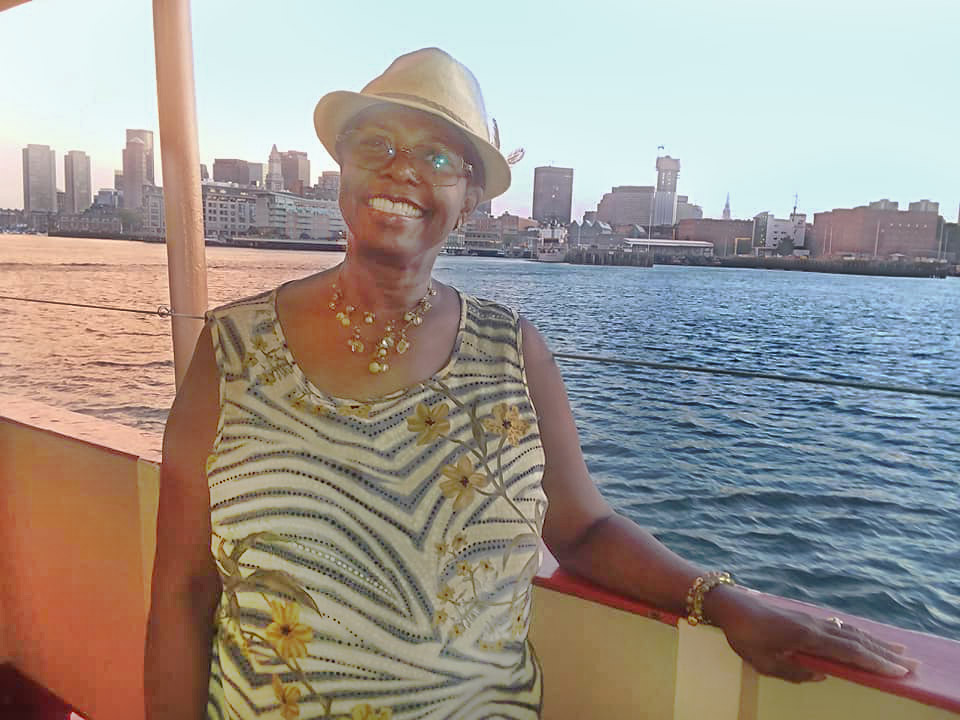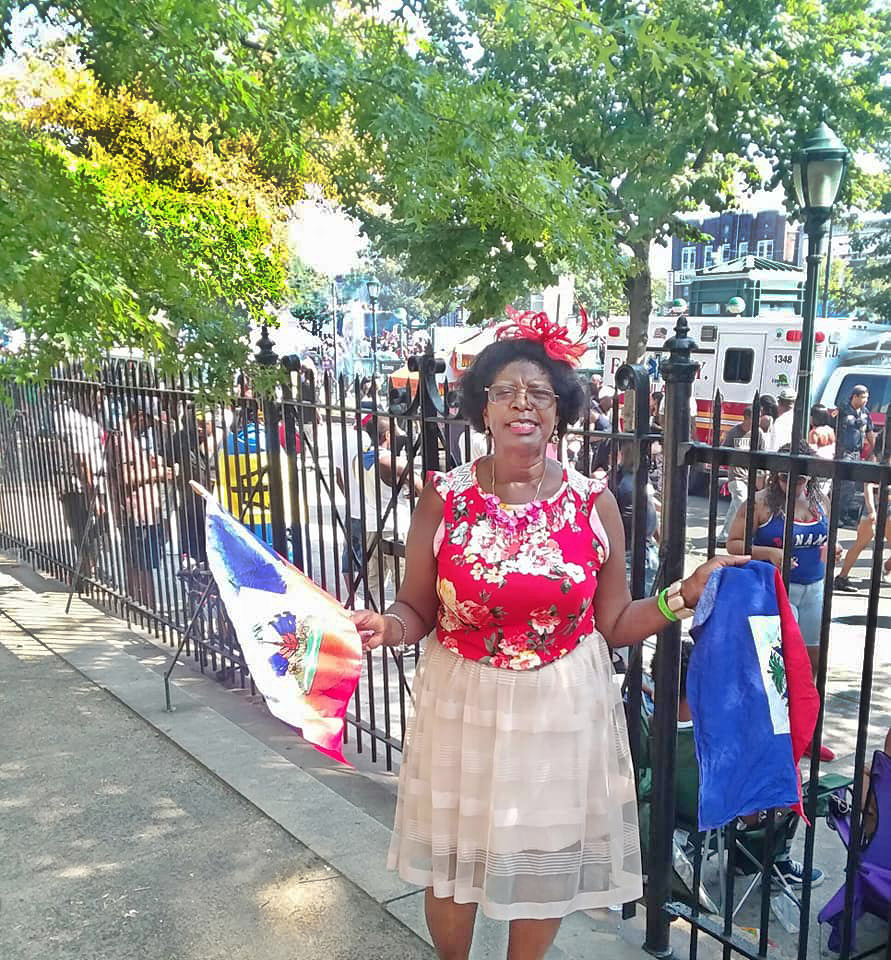Last November 2018 marked 45 years since I arrived in the United States from Haiti. Notwithstanding my longevity as a US passport holder, I still identify as an immigrant and refer to myself as Haitian-American. With this in mind, I share my immigrant journey in the following paragraphs.

Nekita Lamour at a Boston Harbor Cruise.
Telling this story is a way for me to contextualize the anniversary of my 45 years in the Boston, Massachusetts area. My main references have been school and church because of my formal education in those two fields, and my experience as a teacher and a lifelong churchgoer. When my three younger brothers and I arrived on a cold November 29, 1973, my mother and her extended family were already among the first ten to twelve Haitian families living in Cambridge, Massachusetts. Notre-Dame de Pitié (Our Lady of Pity) a French-Canadian parish, was the center of our community life and religious gatherings. As for school, although I started secondary school and had three years of English class in Haiti, I couldn’t speak a word of English upon my arrival. When my late uncle Frank, his wife and my mother (God bless their souls), picked us at Logan Airport, my African-American aunt said to us,“How are you?” I remember replying, “Yes!”
We three older siblings took care of the younger ones: our seven-year-old brother and the one-year-old brother who had been born in the US. We started at Cambridge public schools the first week of December, 1973. My brothers went to the old Webster school and I, the eldest of five, entered Cambridge High & Latin (now Cambridge Rindge & Latin,) as a junior, in 11th grade. As new immigrant students in high school in the 1970s, we Haitians and immigrants from other countries, often Spanish-speakers, had to stick together because there were so few of us. That’s how I was able to keep the Spanish I learned in Haiti. As a teenager speaking Haitian Creole, French, Spanish, it was and still is difficult to speak English without an accent like children who migrated at an earlier age. However, after six months, I was able to understand, start speaking, to write and read English newspapers, as well as follow classes in English. Bilingual education was new. I maintained French by reading Haitian newspapers and writing to friends and families in Haiti via post office mail. Taking minutes as the secretary of the Haitian Youth Group at Our Lady of Pity helped me keep French as well. Though we had Mr. Sylvestre, a Haitian guidance counselor in my second year at the high school, I don’t recall having read any books in French, let alone Creole. After graduation, I attended the former Boston State College and received a BA in Education, went to the University of Massachusetts-Boston for my Masters, then to Weston Jesuit School of Theology (affiliated with the Boston College School of Theology and Ministry after 2008) for a second graduate degree and, after 45 years, I’m still writing “grad school” papers.

Nekita Lamour at the West Indian Carnival in Brooklyn, New York.
Learning about Haitian history, language and culture is also a component of my living in the United States. I started learning more about Haitian Creole (Kreyòl) in the Summer of 1977 when the late Father Antoine Adrien, one of the priests exiled under Papa Doc Duvalier in the 1960s, came to Boston and gave a lecture on “The History of the Catholic Church in Haiti from 1492 to her Current Role in Haiti’s Daily Life”. From that time on, I began reading Creole, learning about Haiti, the Catholic Church and subsequently the world. I stayed in touch with those priests/scholars until their last days. I speak with and visit the two who are still living. In the summer of 1980, I attended the Indiana University Creole Institute (created in 1968 and headed by Prof. Albert Valdman), and continue to learn, teach, read, and write Haitian Creole up to the present day.
The Haitian church community celebrated its first Christmas in Cambridge in 1973, a year or two after Father Jeannot started the St. Leo community in Dorchester. It was a time when every Haitian knew each other whether you lived in Cambridge, Dorchester or Waltham. Reflecting back and watching the multigenerational Haitian population grow, I deduce that we need more connections among ourselves to tell and share our stories as immigrants and sons and daughters of immigrants. Future generations need to know these stories and lessons learned for their survival. Listening to the news and reading newspapers about school bussing conflicts and the Nixon impeachment marked my experience as a new immigrant. Listening to my teacher, Mr. Sylvestre, recount his experiences being chased by a group of white racists near Andrew Station in South Boston provided stories that frame my life as someone living and working in the Boston area since 1973.
As concerns the justice system, in my youth I only knew one classmate, a young man named Joe, who was in trouble at the high school. By 2019, it is more of an exception if there is a Haitian who has not had a male family member dealing one way or another with law enforcement or foster care. I am not talking about a distant friend, I am talking about a brother, an uncle, a blood relative who has not been in jail or arrested. The young women are in trouble too, nowadays.
As a church member, I wonder if those who were baptized at St. Leo or Our Lady of Pity in 1972 and 1973 were still involved in giving and sharing their skills and talents, would there be so many of our compatriots involved with law enforcement? What about those born in the 1980s or 1990s in the Boston area, or came to this country as children or teens, Where are they? Are these young adults involved in their community?
The Haitian immigrants who arrived in the 1980s, 1990s, and 2000s are apparently the new visible and audible faces in the Haitian community. For some reason, there is a great disconnect between them and those of us who came in the 1970s or prior. A former UN employee I met in New York who arrived there in 1955 told me those who came after 1980 or were born here after 1980 do not seem to know other Haitians who arrived in this country prior to 1980. It’s the same thing here in Boston. I met Frère Clozaire who migrated here in 1968, whose sisters came to Malden, Massachusetts in the 1950s. He told me how things have changed and that people do not know each other now. Is this true? Up to the 1980s, Haitians were known as “Frenchies,” educated Black people speaking French. Today those from African countries have the same reputation, among the most highly educated group of immigrants. Given the school to prison pipeline in the US and all those biases and prejudices that affect people of color, I hope 30 to 35 years from now the children of African immigrants will continue to enjoy the same reputation. There needs to be a space for people of color to share their stories. Regardless of our languages or race, people of color suffer from inequities, lack of resources, and overall injustice. It’s up to us as immigrants to develop our own leadership. Some have, but others have not.
Please understand, I don’t want to sound like a whiner complaining. I just want to tell my story as a Haitian immigrant living in the north of Boston area for 45 years. A story of disconnection, a story of survival amid systemic oppression. My story is also an example of a brain drain, of being unable to use my education despite the high illiteracy rate in my immigrant group.
As human beings, we need to find a way to connect and coexist. We cannot be a vibrant community without connecting, knowing each other’s stories, and combining our talents to obtain the resources to help us grow not just individually, but collectively.
I thank you for reading my story.
